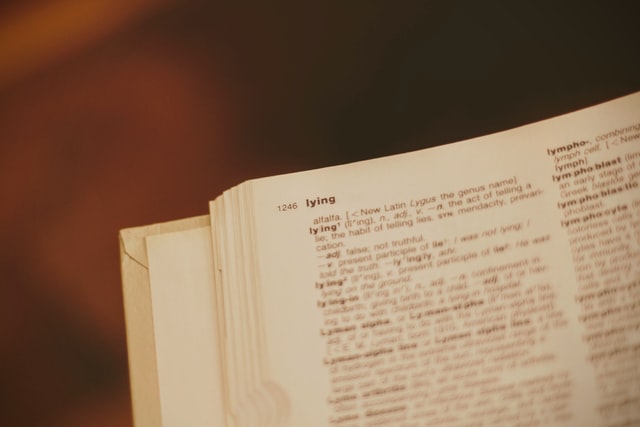Why are people allowed to lie in the Family Court?
 |
| Photo by Joshua Hoehne on Unsplash |
The following was posted on my @familylaw Twitter feed yesterday:
"Family Court is the only place I'm aware of where you can tell lies designed to harm others with no consequence. Do it in a criminal court and it's perjury. Do it anywhere else and it's slander/libel. Do it in Family Court and it's rewarded (if you're a mother)"
As one might imagine, I have come across such expressions of frustration on many occasions over the years. The family court is not exempt from the law of perjury, so why are people allowed to lie to the court with impunity? It is a valid question, deserving of an answer.
Before I attempt to provide that answer I should first explain exactly what perjury is. The offence of perjury is set out in section 1 of the Perjury Act 1911 as follows:
"If any person lawfully sworn as a witness or as an interpreter in a judicial proceeding wilfully makes a statement material in that proceeding, which he knows to be false or does not believe to be true, he shall be guilty of perjury"
Note two things: firstly the lie must be made under oath, and secondly the liar must be aware that it is a lie. I will return to the latter point in a moment.
It is certainly true that people 'get away' with lying to the family court on a regular basis.
Whilst I've not seen any figures for the number of prosecutions for perjury in the course of family proceedings (it is my understanding that figures for this are not specifically kept), I never came across one single prosecution in my 25-odd years practising as a family lawyer, whether in my own cases or other cases I heard about.
And during that time I often came across instances of lying to the court. The lying might be in many forms. It might, for example, be a parent in children proceedings making false allegations about domestic abuse, or it might be a party in financial remedy proceedings lying about their means. Lies, great or small, are told all the time.
So what is the answer? Well, three things spring to mind:
1. Firstly, the family courts want witnesses to speak freely, without fear of sanction, especially in children proceedings. I have read at least one, and probably more, judicial expressions of this point, but sadly I haven't been able to locate any, despite spending literally hours searching before writing this post.
The point is that often in family proceedings there is no independent evidence - it is just one party's word against the other. What if the court doesn't accept what the witness says? If there is then a serious possibility of criminal sanctions against that witness, then they are likely not to give the evidence in the first place.
And family proceedings, particularly where the welfare of children is involved, really are different from other types of court proceedings. The court wants to get to the heart of what the parties are thinking, rightly or wrongly. The court will adjudicate upon what is true and what is false (and yes, sometimes they will come to the wrong conclusion), but the mere fact that a lie has been told can be telling in itself.
2. Linked to this is the point I mentioned above: parties to family proceedings often genuinely believe that a false statement is true, even if no reasonable person would believe it to be true. Emotions often run so high that the truth really can become blurred, especially where there is extreme bitterness between the parties.
3. But of course there are many occasions when the witness is fully aware that they are lying and, indeed, when they do so in the belief that they will get away with it.
But they won't necessarily get away with it, even if there is no perjury prosecution.
There are other consequences of blatantly lying to the family court. These can include costs sanctions, particularly where the case has taken much longer, and therefore significant further costs have been incurred, because of the lie.
And lying can be a risky endeavour, as the court may make a finding that the perpetrator is an unreliable witness, which may put into doubt other evidence they have given.
And if the 'lie' is in the form of a failure to disclose a material matter, then it is open to the court to draw an adverse inference against the perpetrator, which may be to their considerable disadvantage.
And lastly there is, however slight, the possibility of prosecution for perjury. Yes, it can happen. For example in the 2015 case Kaur v Randhawa Mr Justice Mostyn directed that his judgment and the court bundle should be sent to the DPP, for her to consider whether proceedings for perjury should be brought against the husband.
In short, you are not rewarded by the family court for lying. Even if you're a mother.
Comments
Post a Comment
Thank you for taking the time to comment on this post. Constructive comments are always welcome, even if they do not coincide with my views! Please note, however, that comments will be removed or not published if I consider that:
* They are not relevant to the subject of this post; or
* They are (or are possibly) defamatory; or
* They breach court reporting rules; or
* They contain derogatory, abusive or threatening language; or
* They contain 'spam' advertisements (including links to any commercial websites).
Please also note that I am unable to give advice.